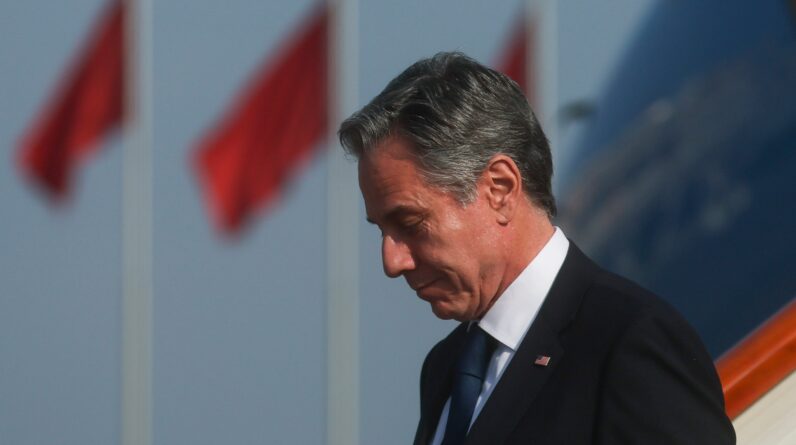
Antony Blinken, the US Secretary of State, has arrived in Beijing on his first visit to China in nearly five years.
Blinken’s two-day trip comes amid frosty bilateral ties and after the discovery of an alleged spy balloon over the United States in February prompted him to delay a trip that had been planned for the same month.
With the world’s two largest economies clashing on a range of issues from trade to technology to regional security, both China and the United States have expressed cautious hopes for improved communication, though they have played down expectations of a significant advance.
US President Joe Biden played down the balloon episode as Blinken headed to China, saying: “I don’t think the leadership knew where it was and knew what was there and knew what was going on.”
“I think it was more embarrassing than intentional,” Biden told reporters Saturday.
Biden said he hoped to meet again with Chinese President Xi Jinping after a lengthy meeting in November on the sidelines of a Group of 20 (G20) summit in Bali, where the two agreed on Blinken’s visit.
“I look forward to meeting with Xi again in the coming months and talking about the legitimate differences that we have, but also how there are areas where we can get along,” Biden said.
The two leaders are likely to attend the next G20 summit in September in New Delhi, and Xi has been invited to travel to San Francisco in November, when the United States hosts leaders of the Asia-Pacific Economic Cooperation grouping ( APEC).
Blinken is expected to meet with senior Chinese officials and attend a banquet at the state guesthouse in Diaoyutai Gardens.
A phone call between Blinken and his Chinese counterpart Qin Gang underscored the rising tension between the two sides, with the Chinese foreign minister stressing the need for the United States to recognize Beijing’s “core concerns,” such as Taiwan. China’s top diplomat also said the US should “stop interfering in China’s internal affairs and stop harming China’s sovereignty, security and development interests in the name of competition.”
Ties between Beijing and Washington have soured across the board, raising the specter that the two could one day clash militarily over the self-ruled island of Taiwan, which China claims as its own.
They are also at odds over issues ranging from trade, U.S. efforts to curb China’s semiconductor industry and Beijing’s human rights record.
Particularly alarming for China’s neighbors has been its reluctance to engage in regular military-to-military talks with Washington, despite repeated US attempts at dialogue.
At a press conference Friday before leaving for Beijing, Blinken said his trip had three main goals: to establish mechanisms for crisis management, to advance the interests of the United States and allies, as well as to speak directly about concerns related and explore areas of potential cooperation. .
“If we want to make sure, as we do, that the competition we have with China doesn’t conflict, the place to start is to communicate,” Blinken said.
The United States has also kept its allies close, with Blinken speaking by phone with his counterparts in Japan and South Korea during his 20-hour trip across the Pacific.
Biden’s national security adviser, Jake Sullivan, also traveled to Tokyo for separate trilateral meetings with Japan, South Korea and the Philippines.
In recent months, the US has reached agreements on troop deployments to southern Japan and the northern Philippines, both strategically close to Taiwan.
Before leaving, Blinken also met in Washington with his counterpart in Singapore, a US ally, who expressed hope that the US would remain a power but also find ways to live with a China on the rise
“Blinken’s trip is essential, but not sufficient,” Singapore’s Foreign Minister Vivian Balakrishnan said.
“There are fundamental differences in perspective, in values. And it takes time for mutual respect and strategic trust to be built.”
Blinken is the first US diplomat to visit Beijing since the 2018 shutdown of his predecessor Mike Pompeo, who later advocated unrestricted confrontation with China in the final years of Donald Trump’s presidency.
[ad_2]
Source link





